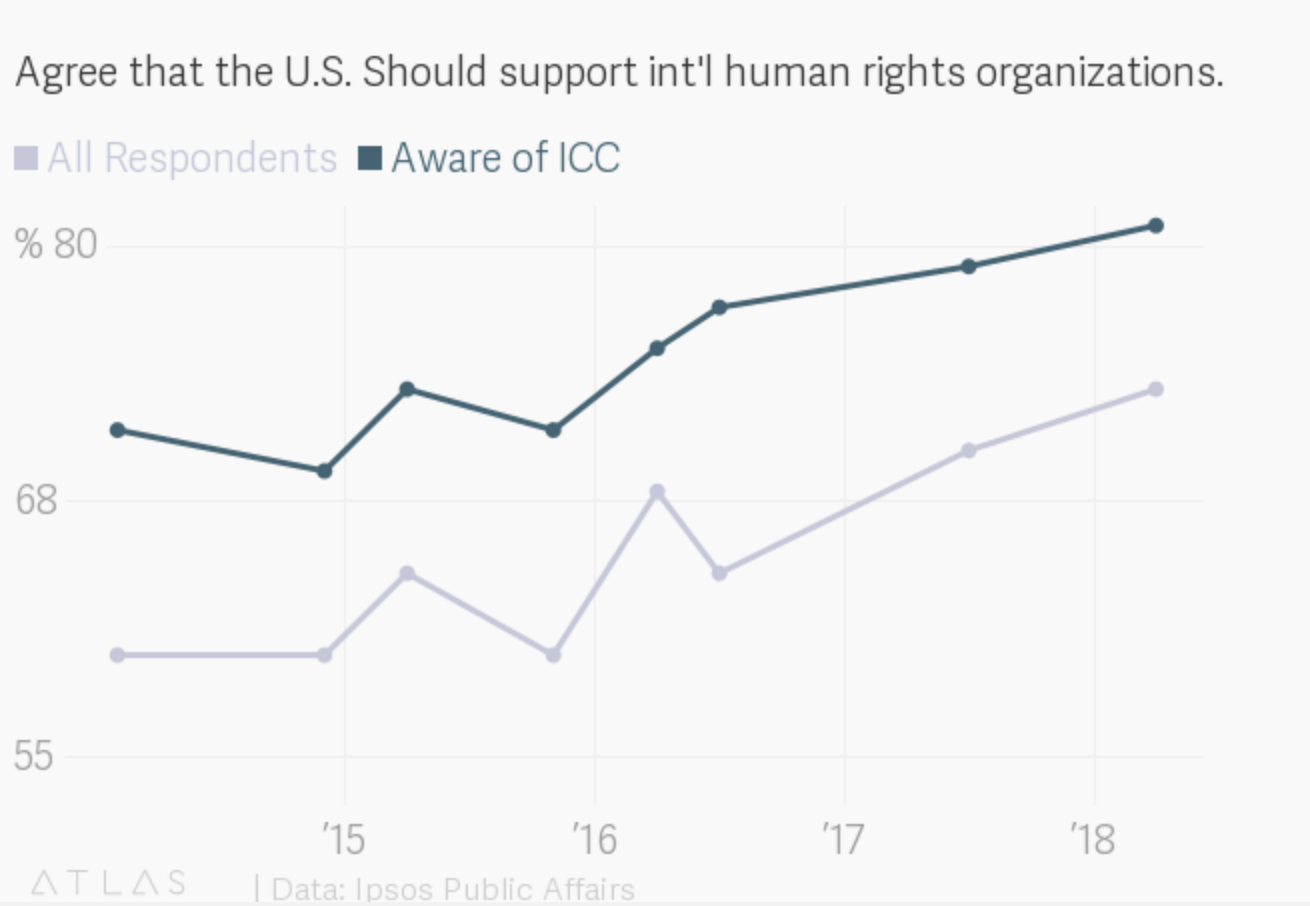The latest round of Ipsos polling done for the American Bar Association’s International Criminal Court (ICC) Project shows that Americans have maintained elevated awareness of and support for the ICC. Support has also increased in certain categories since poll began in 2014. The poll also found that more Americans than not support an ICC investigation of alleged crimes in Afghanistan regardless of whether the targets of the investigation are American personnel, members of groups like the Taliban or Islamic State, or all of the above.
Knowledge and Awareness of the ICC
This poll shows a modest increase in overall American awareness of the ICC itself. Just under half of Americans (45%) are aware of the Court, up from 40% when this tracking began in 2014. Despite increased awareness, many Americans (almost four out of ten) incorrectly believe that United States is a member of the ICC.
Awareness of the ICC continues to be strongest among millennials (age 18-34) at 57% and among men of all ages at 27%.

Perceptions of the Court’s Objectives
In our last poll in July 2017, there was a 15% increase in Americans’ belief that the United States should dedicate resources, including financial, military and intelligence resources, to international organizations that support human rights and that hold individuals accountable for mass atrocities. That number again increased slightly in the April 2018 poll, from 47% in 2014 to 63% today.
Perception of the Court and US Membership
In both the July 2017 poll and in this most recent poll, there was an increase in all Americans’ belief that the US should join the ICC or become more involved in the Court (from 34% in February 2014 to 50% in July 2017 & May 2018). This increase appears to come from the undecided crowd; today, less Americans have an opinion on this matter with only 29% reporting “I don’t know”, down from 42% in 2014.
The sentiment that the US should join or more fully support the ICC is especially strong among those who are aware of the ICC (64%). Yet, for those aware of the Court, 37% believe joining the ICC would compromise US sovereignty, but only 18% believe the US should not join the ICC.
Support of ICC potentially investigating members of the Taliban/Islamic States, United States Armed Forces, and the CIA
The most surprising results of this poll came from questions about the ICC’s potential investigation in Afghanistan. Predictably, a strong majority of Americans (68%) support the ICC opening an investigation in Afghanistan of alleged crimes committed by members of the Taliban or so-called Islamic State, with 42% reporting they strongly support it.
However, 45% of Americans either strongly or somewhat supported the ICC investigating alleged crimes committed by members of the US military and CIA, whereas only 21% of Americans strongly or somewhat opposed an investigation of Americans.
Likely a bigger surprise was that 81% of those polled either did not change their opinion, or became more favorable to the ICC, after they were informed that the Court would potentially investigate alleged crimes committed by members of all groups involved, namely the US military, CIA, Taliban, and Islamic State. Specifically, 50% of all Americans said that this information did not change their opinion of the ICC; 31% said it made their opinion of the ICC much or somewhat more favorable; 19% said it made their opinion of the Court much or somewhat less favorable.
About the Study
These are findings from an Ipsos poll conducted April 4-6, 2018 on behalf of the American Bar Association. For the survey, a sample of roughly 1,004 adults age 18+ from the continental U.S., Alaska and Hawaii was interviewed online in English. The sample includes 489 adults at least aware of the International Criminal Court.
The sample for this study was randomly drawn from Ipsos’s online panel (see link below for more info on “Access Panels and Recruitment”), partner online panel sources, and “river” sampling (see link below for more info on the Ipsos “Ampario Overview” sample method) and does not rely on a population frame in the traditional sense. Ipsos uses fixed sample targets, unique to each study, in drawing sample. After a sample has been obtained from the Ipsos panel, Ipsos calibrates respondent characteristics to be representative of the U.S. Population using standard procedures such as raking-ratio adjustments. The source of these population targets is U.S. Census 2013 American Community Survey data. The sample drawn for this study reflects fixed sample targets on demographics. Post-hoc weights were made to the population characteristics on gender, age, race/ethnicity, region, and education.
Statistical margins of error are not applicable to online polls. All sample surveys and polls may be subject to other sources of error, including, but not limited to coverage error and measurement error. Where figures do not sum to 100, this is due to the effects of rounding. The precision of Ipsos online polls is measured using a credibility interval. In this case, the poll has a credibility interval of plus or minus 3.5 percentage points for all respondents. Ipsos calculates a design effect (DEFF) for each study based on the variation of the weights, following the formula of Kish (1965). This study had a credibility interval adjusted for design effect of the following (n=1,017, DEFF=1.5, adjusted Confidence Interval=5).
The poll also has a credibility interval plus or minus 5.1 percentage points for adults who are at least aware of the International Criminal Court.
For more information about conducting research intended for public release or Ipsos’ online polling methodology, please visit our Public Opinion Polling and Communication page where you can download our brochure, see our public release protocol, or contact us.

